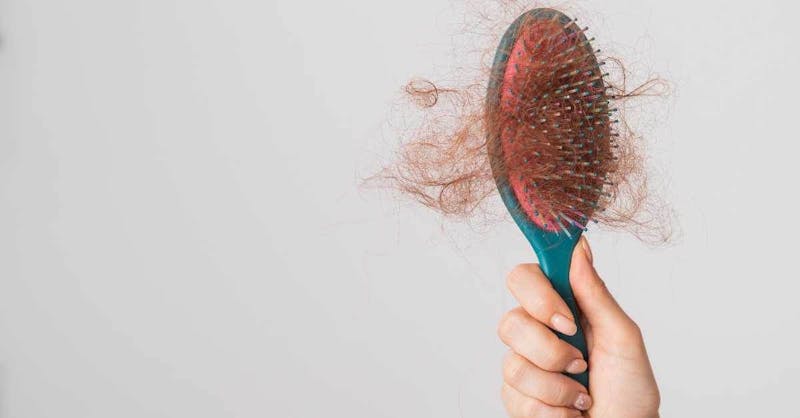Rooted in Results Let’s Get Growing
Hair loss is a symptom. We begin every journey by finding the cause, so your treatment plan isn’t just hopeful—it’s strategic, personalized, and proven to work.
Contact Our Team
You probably already know that too much stress can cause high blood pressure, stroke, heart disease, diabetes and even obesity. But you may not realize that stress can also cause hair loss. In fact, high levels of stress can cause hair loss or worsen different types of hair loss, characterized by:
Dr. Mary Wendel, MD, is the National Medical Director of Medi Tresse, and explains this in more detail on our YouTube podcast. Stress can play a role in several hair conditions, including telogen effluvium, alopecia areata, and scarring alopecia. Let’s take a more in-depth look at the subject of stress and hair loss in women.
Before we go further, it’s important to understand the three growth phases of the hair. The three phases of the Hair Growth Cycle are:
An animal study appearing in Nature found that a major stress hormone produced by the adrenal glands – corticosterone in mice -- places hair follicle stem cells into an extended resting phase. This all happens without regenerating the follicle or hair. The researchers found that the pathway of the cell type and molecule responsible for sending the stress signal to the stem cells can be targeted to restore hair growth.
Dr. Wendel points out that stress triggers the adrenal gland to produce cortisol which then triggers mast cell degradation in the skin and around the hair. This is called neurogenic inflammation, which is thought to cause the hair to shed.
The equivalent hormone to corticosterone in humans is cortisol, often referred to as the “stress hormone. The Harvard Gazette says that elevated stress hormones can have a negative effect on hair follicle stem cells. This 2021 article by the Gazette describes the discovery of a molecule that stimulates the stem cells at the base of the follicle. With chronic stress, elevated cortisol blocks the secretion of this molecule which slows the regrowth of normally cycling hair. The result: increased hair loss during times of stress.
Your immune system can be compromised greatly when you are under constant stress. Immune cells change their behavior depending on how severe the stress is. Pro-inflammatory chemicals known as cytokines are released to eliminate disease-producing bacteria and viruses, and promote healing.
However, chronic stress can result in continued inflammation and chronic diseases, such as auto-immune diseases. This includes auto-immune diseases known to cause hair loss, namely alopecia areata and scarring alopecia.
It’s important to point out that not all stress is bad; in fact, it can help protect you and make you more alert. When you feel stressed, your body produces higher levels of cortisol. This is fine in short bursts, as it can actually boost immunity and limit inflammation. Over time, though, when your body reaches the point of chronic stress, it gets used to having too much cortisol in the blood, which paves the way for more inflammation, says the Cleveland Clinic.
High stress levels may also cause anxiety and depression, which can lead to even higher levels of inflammation and an over-worked immune system that can’t operate properly.
Studies have shown telogen effluvium as being one of the consequences of the COVID-19 pandemic. During COVID, we saw elevated levels of stress, which can trigger telogen effluvium. Emotional stress may force more hairs than normal into the shedding phase, but this may not begin until two to three months after the stress starts, says the AAD.
Watching your hair fall out is certainly stressful in and of itself. That’s why it’s important to try and de-stress.
From yoga and meditation to exercise and supplements, there are many ways you can try and reduce the stress you feel in your life. Lifestyle changes to improve stress include:
Mindfulness meditation therapies, which can include breathing exercises and yoga, have been proven to be effective in reducing reducing stress, anxiety and depression, and can reduce pain, fatigue and stress in those suffering from chronic pain. Other studies have shown that meditation, which reduces cortisol levels and reduces inflammation, can boost the immune system.
A 2017 study appearing in “Frontiers of Human Neuroscience” demonstrated that after a three-month yoga retreat, participants showed improved levels of anti-inflammatory cytokines, improved cortisol levels, and decreased anxiety.
Diet is another area where you can lessen your stress levels. A balanced diet of fruit, protein, grains and vitamins will ensure a smooth-running immune system. And because sleep affects stress levels, make sure you’re eating foods that won’t wind you up before bedtime. Dr. Wendel recommends following Dr. Weil’s anti-inflammatory diet pyramid or Blue Zones.
Dr. Wendel also recommends taking supplements for hair loss. Poor eating habits are common during times of stress, which can result in deficiencies in micronutrients, vitamins and minerals. When choosing supplements, look for ones that contain copper, biotin, iron, zinc, as well as vitamins A, C, and E.
It’s also important to get enough ZZZs. A recent Mount Sinai study showed that a consistent lack of sleep can negatively impact immune stem cells, increasing the risk of inflammatory disorders. In addition, poor sleep is associated with increases in systemic inflammation and higher levels of pro-inflammatory cytokines.
Believe it or not, social isolation can compromise the immune system and increase inflammation. In fact, loneliness can wreak havoc on your physical, mental and cognitive health, leading to depression, poor sleep quality, accelerated cognitive decline, impaired executive function, poor cardiovascular function, and impaired immunity.
If you are experiencing hair loss and suspect it is due to stress, we welcome you to schedule your appointment now at the location of your choice.